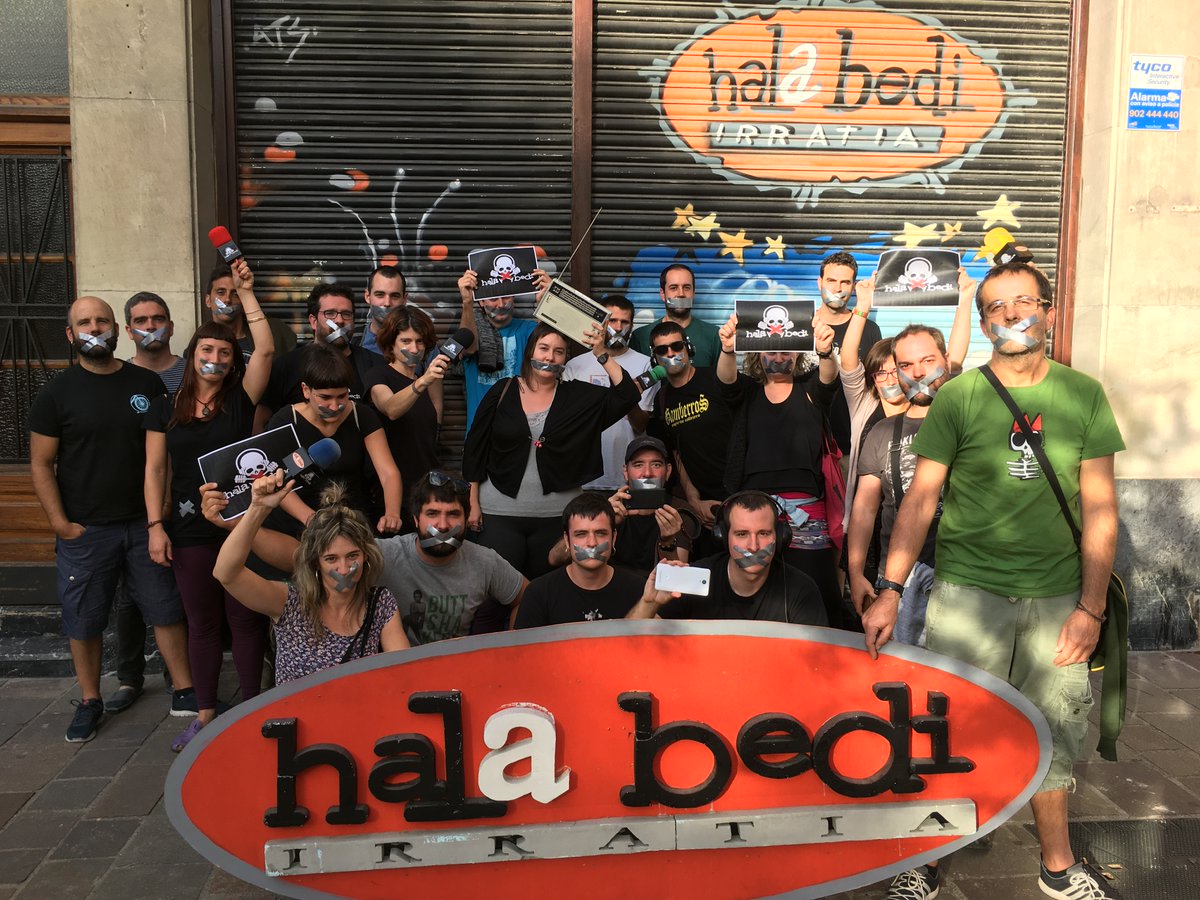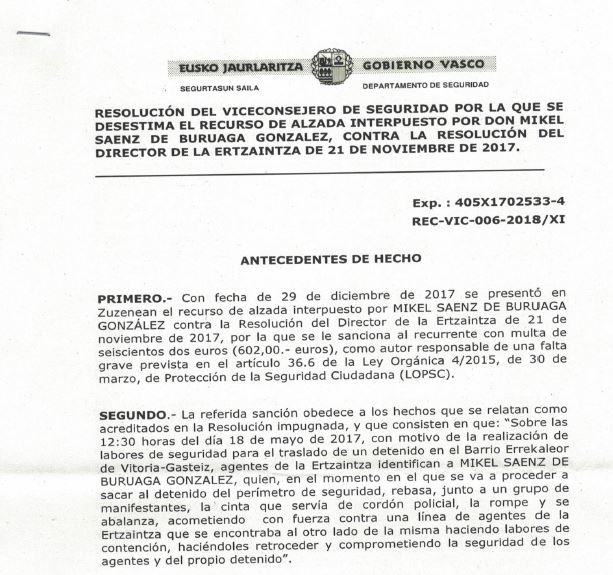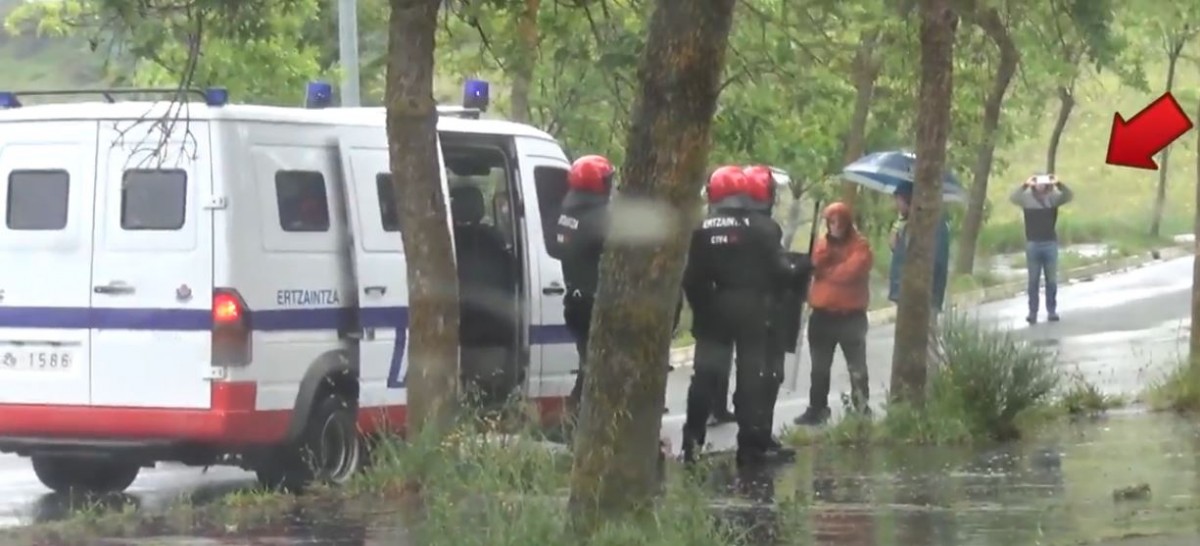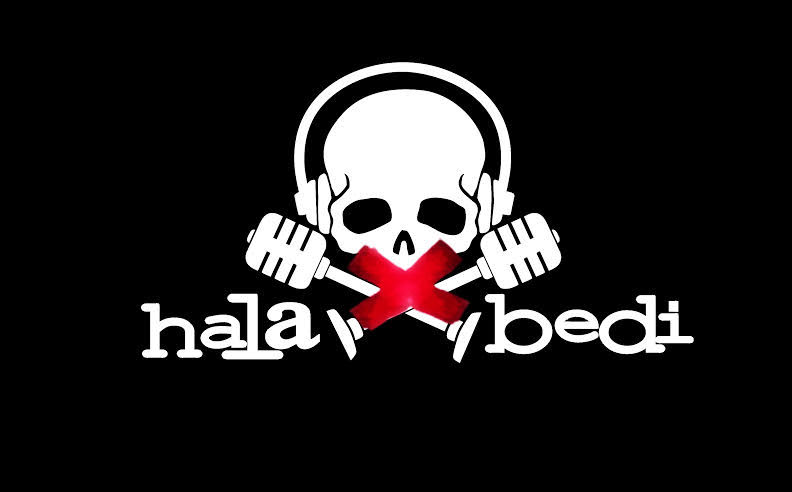Hala Bedi is taking the Basque Government to court for attacking the freedom of information.
After almost a year-long process, the Security Department of the Basque Government has confirmed that it will prosecute the fine issued against the Hala Bedi radio journalist, Mikel Sáenz de Buruaga. This fine was issued as Buruaga was covering a protest in the occupied suburb of Errekaleor in Gasteiz, and is the first case in which a Basque journalist has fallen victim to the so called “muzzle law.”

The independent radio station Hala Bedi has announced that it will “fight to the end” to resist what it considers “an attack on the freedom of information.” Moreover, as has been denounced, this attack is “based on a false statement by the State police,” which will be contested in court on contienscious and administrative grounds.
The radio has also harshly criticized the attitude of the regional PNV Basque Government. By applying the Muzzle Law, approved by the conservative PP central government in 2015, “which threatens civil and political rights,” the Basque state government “lends institutional support to a political stunt.”
At the end of an administrative process described as “Kafkian,” Hala Bedi believes that it’s right to legal defense have been severely violated. The evidence presented by the radio, including audiovisual records and statements by eyewitnesses that directly contradict police allegations, has been systematically ignored.
Moreover, various factors have lead the station to the conclusion that “effectively, we are in a political setup.” This did not arise spontaneously on the day of the protest but was a planned response “to punish the journalistic work carried out in Errekaleor” and “as revenge for our public denunciation” of the Basque Nationalist Party state government.
Reconstructing Events Silenced, beaten and then punished.
But what really happened on the morning of the 18th of May 2017? Why was a journalist from Hala Bedi fined after being attacked by the police while doing his job? Why wasn´t the journalist informed of the fine on the day it was issued? Why is it that the police reports do not mention that Sáenz de Buruaga was a journalist despite having shown an accredited press credential?
On that 18th of May, during a police intervention to enforce cutting off the electricity in Errekaleor, two Hala Bedi journalists were on the scene from the early morning. All of the content published throughout the day can still be found easily on the internet, including minute by minute updates on social media, live telephone linkups and a video which received millions of hits at the time of the protest.
Around 12:30, the Hala Bedi journalist Mikel Sáenz de Buruaga, was attacked and injured by state police as he recorded a police charge with a mobile phone which was destroyed when it was intentionally thrown on the ground by the attacking police officer.
Immediately following this attack, two journalists identifying themselves with press cards demanded to see the attacking officer’s ID and asked for an explication for his actions from the police sergeants in charge of the operation. Finally, however, it was the journalist who were formally identified by the police.
In the case of Mikel Sáenz de Buruaga, the police reached the point of confiscating his media credential, together with his national ID card, for several minutes, without offering any explication. FInally the commanding officer returned both documents, together with a handwritten note supposedly indicating the ID number of the officer who had attacked Buruaga and destroyed his phone.The commander said at this time “We know you already. We know that you´re with the radicals.”
All of this happened without the journalist being advised at any point of any illegal or improper behaviour or any intention to issue a fine. The same day as the protest, Hala Bedi radio issued a press release denouncing events at the protest.
In the following video- presented as evidence at one of the appeals hearings- you can see how the Hala Bedi journalists carried out journalistic work throughout the morning from behind police lines: recording with mobile phones, sending images over social networks and going to air over their mobiles.
Soon after arriving, the state police deployed a second line of agents and the entrance to the suburb, which prevented many journalist from other media outlets from providing coverage of what was happening inside the suburb itself. Many of these journalists denounced the restriction of access and some used images recorded by Hala Bedi as part of their own coverage.
A Kafkaesque Process The Labyrinth of the Muzzle Law and administrative processes
In spite of this, almost two months after these events and without any prior notice, the Basque Government sent a fine of €602 for a serious breach of the “Citizen Safety” law, more commonly known as “the Muzzle Law.”
The fine was issued on the basis of a police statement according to which the journalist had breached article 36.6 of this law, being “disobedience or resistance to authority,” by, supposedly, passing through a police cordon on the 18th of May. Both the journalist and Hala Bedi have rejected these accusations from the beginning and consider the fine to be “based on revenge” and “an attack on the freedom of information.”
At the time, the assembly governing Hala Bedi decided to respond collectively to the attack and denounce it publicly, demonstrating their willingness to “disobey,” leave the fine unpaid and appeal until all avenues were exhausted. This same meeting declared that the fine was “an injustice” as “the law itself is unjust and the accusations are false.”
There were huge demonstrations of solidarity and an impressive media impact, as this was the second case in which a Basque journalist was targeted by the Muzzle Law (the first case involved Axier Lopez, from the newspaper Argia, against whom the penalty was eventually withdrawn). Many collectives and associations demonstrated their rejection of the application of this law, declaring the fine to be “a violation of the freedom of the press.”:
- On the 28th of June Association of Basque Journalists and the Basque Press College issued a statement denouncing this “direct attack against the freedom of information.”
- The platform in Defence of the Freedom of Information (PDLI) also presented a formal complaint before the ombudsman in which they denounced “fines against the freedom of information camouflaged as general infractions” and the “uncontrolled and disproportionate increase” in the value of these fines.
- In August, the ombudsman began actions as a response to the complaint made by PDLI. In parallel, Hala Bedi began to make contacts with Ararteko, who confirmed that there was an ongoing process by the ombudsman.
- Recently, the PDLI included the case in its report “2017, the Year of Crimes of Opinion.”
Also in August, Buruaga, the journalist from Hala Bedi, launched his first administrative appeal. Since then after 8 months of bureaucratic processes including a total of six official notifications and five appeals, on the 28th of March the Department of Security of the Basque government issued a final notification that it would be prosecuting the fine.

Hala Bedi denounces that this journalist has been subject to “a situation of defencelessness” throughout the process and that he has ended up being fined for “totally fabricated events”. Hala Bedi similarly denounces, amongst many other things, these elements which were “constant throughout the labyrinth of notification-appeal-notification”. By way of summary:
- The case file does not contain the events for which a fine was supposedly issued. The Security Department went as far as denying that Miguel Sáenz de Buruaga ever identified himself with his press credential which is “especially fragrant, lying directly about an event which various witnesses saw first hand,” according to the complaint made by Hala Bedi.
- Despite this, the case file make constant reference to article 52 of the Citizen Safety Law, which states that “accusations (…) made by agents in the field exercising their responsibilities who have witnessed events first hand, prior to ratification (…) constitute sufficient basis to adopt subsequent proceedings.” It’s the clasic “your word against theirs” situation taken to the extreme, given that there is no possible way to demonstrate their word is false. What’s more, to this day, despite having requested it repeatedly, the defence is yet to receive the declarations of the agents who made the accusations, which are indispensable for the application of article 52.
- Statements written by two witnesses have been rejected, as their impartiality has been questioned as they are also journalists working with Hala Bedi. One was a direct witness to events, the other based at the station in constant contact with the accused.
- The validity of a video presented by the defense as evidence has been rejected, because “it doesn’t show a full record of prior events.” According to Hala Bedi, this rejection “completely ignores the contents of the video and the fact that the only video that could supply definitive proof was recorded on the mobile destroyed by police”.

Hala Bedi denounces “The formula is clear: guilty until proven innocent”. For this reason there is a total rejection “of the fine, of the administrative process and of the Muzzle Law in general.” The consider that the process “has been based on a lie” and have advised that they will “resist until the end” so that “this injustice is not carried through.”
Without Silence, Without Muzzes In Defense of Freedom of Expression
This is not an isolated case. This is the first Basque journalist to be definitively penalised under the Muzzle Law, but the law has been applied by the Basque Government in another
8 000 cases since July 2016 despite their commitment not to do so. This law is being used to violate, amongst other things, civil and political rights, such as the freedoms of expression, press and information.
This is not an attack on one journalist, but an attack against Hala Bedi, against Errekaleor, against social movements, against political and social dissidence, and, especially, against the freedom of information. Hala Bedi has decided collectively to disobey this law and to continue to act with conscience because the law is unjust and the accusations are false.
Over the next weeks, Hala Bedi will present a conscientious-administrative appeal against the fine. We intend to exhaust all legal means available and to go to court to defend the freedom of information.
Also, this Friday the 20th of April, at 10:30 in the morning, Hala Bedi will appear before the Security Commission of the Basque Government to denounce this attack on the freedom of information, demanding that the penalty be suspended and that the Basque Government uphold its commitment not to apply the Muzzle Law.
Meanwhile we will keep doing our job, as we have done up until now. This will be the greatest possible act of disobedience in the face of this injustice. Without silence, without being muzzled. For ourselves and for all of us.

Hala Bedi babestu nahi duzu?
Hala Bedin proiektu komunikatibo libre, komunitario eta eraldatzailea eraikitzen ari gara. Egunero, ehundaka gara proiektuan parte hartzen dugun pertsonak, eragiten digun errealitatea behatuz eta hura eraldatzen saiatuz, herri mugimenduekin batera.
Gure edukiak libreak dira, inork ez digulako agintzen zer argitaratu dezakegun eta zer ez. Eta eduki hauek dohainik eta modu libre batean zabaltzen ditugu, hedapena, elkarbanatzea eta eraldaketa helburu.
Halabelarririk gabe, Hala Bedi ekonomikoki sostengatzen duten bazkiderik gabe, hau ez litzateke posible izango. Egin zaitez halabelarri eta babestu Hala Bedi!

